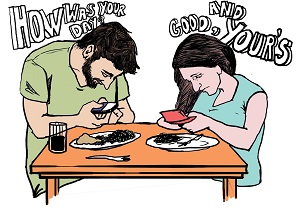At the Intersection of Relationships and Social Media
At the Intersection of Relationships and Social Media

Social Media outlets like Facebook, Snapchat, and Instagram have become a behemoth daily presence in our lives. Facebook COO Sheryl Sandberg recently reported there are an astonishing 1.23 billion daily log-ons to the social media giant per day, representing an 18% increase in the last year (as of September, 2016). CEO Evan Spiegel’s app Snapchat offers users an experience where video, photo and text messages are live for only 24 hours- allowing for an instant and fleeting connection between people. This app is wildly popular with the millennial set, and as February 2017, there are 158 million active Snapchat users.
As a family and couples psychologist in the Bay Area, many of my couples bring social media usage and concerns stemming from it into our sessions. Social media has become an addendum, if not projection, of our ego, connectedness, and self-worth- all constructs that are deeply-rooted in the human condition. This could lead to spousal jealousy, feelings of distrust, comparing and contrasting, and misunderstandings. Before things get out of hand quickly, here are four tips I offer couples experiencing relationship strains due to social media.
1. Stop snooping
Nothing good ever came of digging into your partner’s emails- there are landmines at every click. And if you are feeling the need to snoop, be mindful enough to reflect and analyze if it’s truly your partner you don’t trust, or if you have trust issues of your own. This could be a good time to sit down with your partner and/or therapist to have a real conversation about these feelings.
2. Don’t believe your own hype
It happens- you post an update about your job promotion, and the internet goes wild with praises, likes, and messages lauding your abilities. All of a sudden, your online friends, and maybe even an ex flame, are showing you the attention you may be seeking from your partner. At this point, you must recognize this flattery will be transient, and you’ll soon be last week’s headline. But the attention you seek from your spouse is real and enduring- so talk to them about it rather than ignoring and resenting it.
3. Set aside a dedicated hour that is social media- and laptop-free
These days, we are so connected online through email, text and apps that we forget to nurture our in-real-life relationships. If you are in a situation where one or both partners is spending an exorbitant amount of time connected to their phone, set aside a daily hour to practice your communication skills. This will remind your partner that they are your priority and leave less space for feelings of neglect or loneliness.
4. Quit the stealthy behaviors
If you find yourself closing your laptop every time your spouse passes by, something is wrong. Hold yourself accountable to your browsing history, and be self-aware enough to know when it enters uncomfortable and inappropriate territory. Your partner will easily pick up cues that you’re being sneaky, allowing for a whole new set of issues to emerge.












